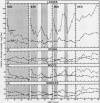Abstract
When arrival of shoot supplied carbohydrate to the nodulated root system of soybean was interrupted by stem girdling, stem chilling, or leaf removal, nodule carbohydrate pools were utilized, and a marked decline in the rates of CO2 and H2 evolution was observed within approximately 30 minutes of treatment. Nodule excision studies demonstrated that the decline in nodulated root respiration was associated with nodule rather than root metabolism, since within 3.5 hours of treatment, nodules respired at less than 10% of the initial rates. Apparently, a continuous supply of carbohydrate from the shoot is required to support nodule, but not root, function. Depletion of nodular carbohydrate pools was sufficient to account for the (diminishing) nodule respiration of girdled plants. Of starch and soluble sugar pools within the whole plant, only leaf starch exhibited a diurnal variation which was sufficient to account for the respiratory carbon loss of nodules over an 8 hour night. Under 16 hour nights, or in continuous dark, first the leaf starch pools were depleted, and then nodule starch reserves declined concomitant with a decrease in the rates of CO2 and H2 evolution from the nodules. Nodule soluble sugar levels were maintained in dark treated plants but declined in girdled plants. The depletion of starch in root nodules is an indicator of carbohydrate limitation of nodule function.
Full text
PDF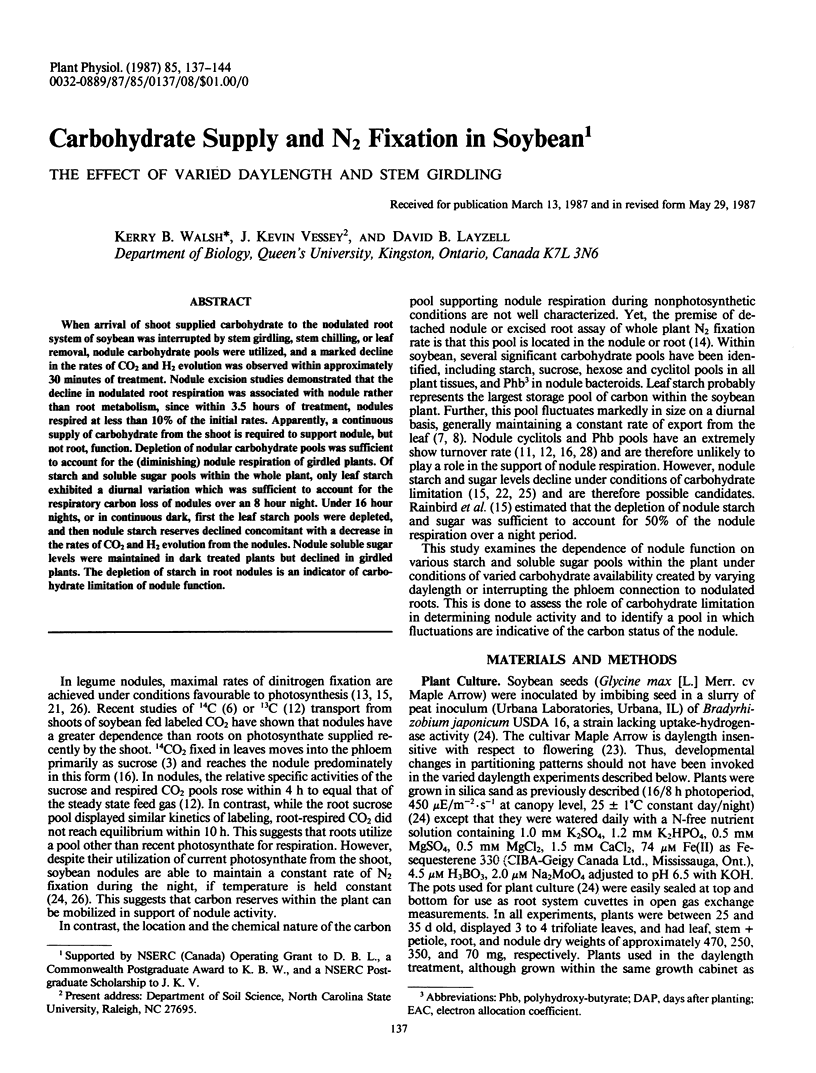
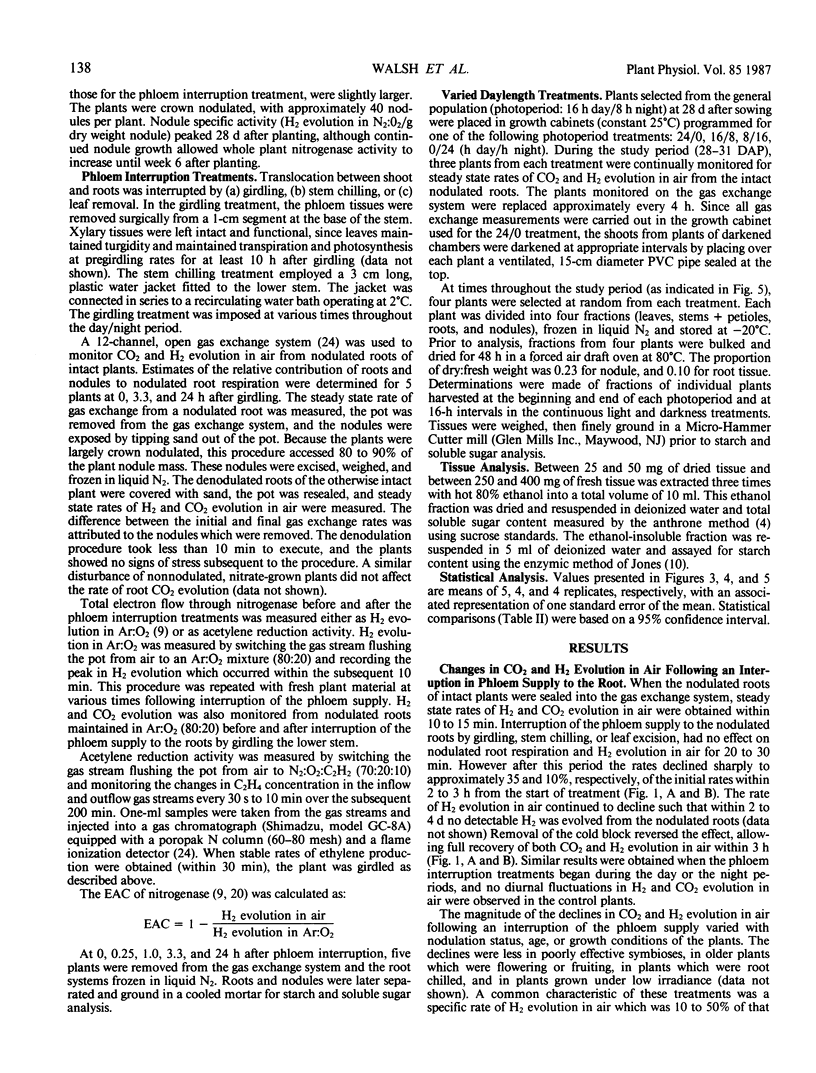
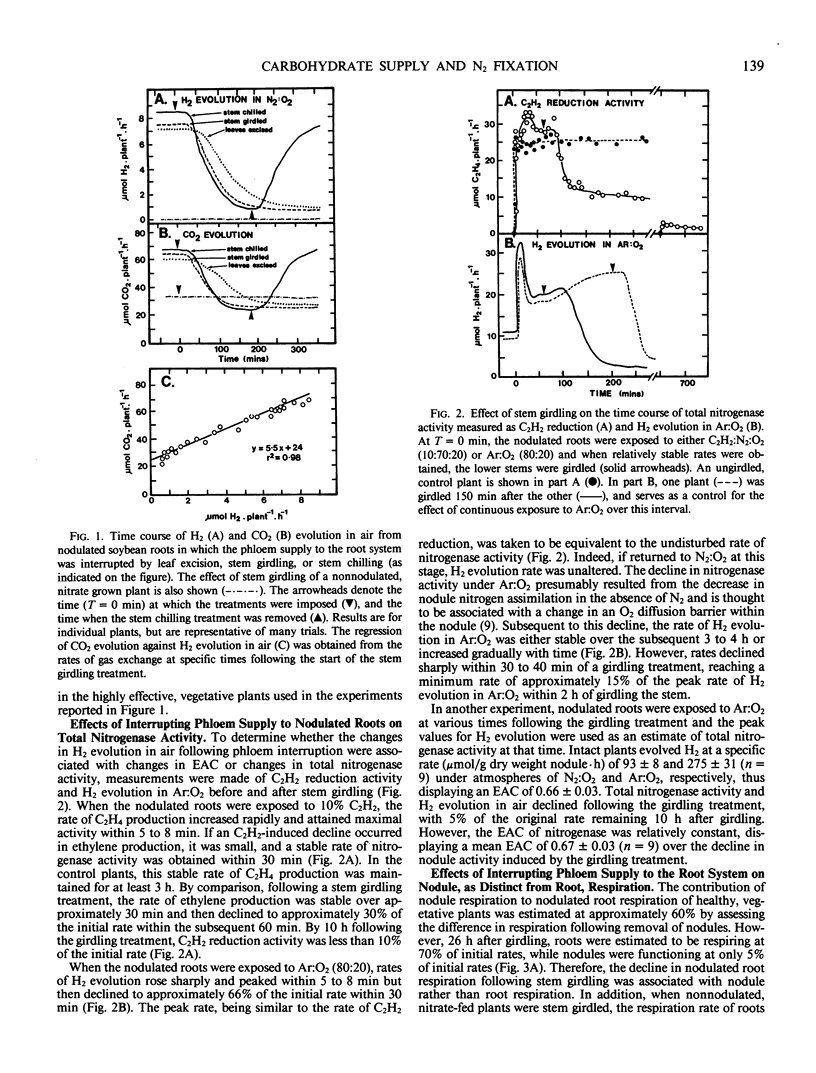
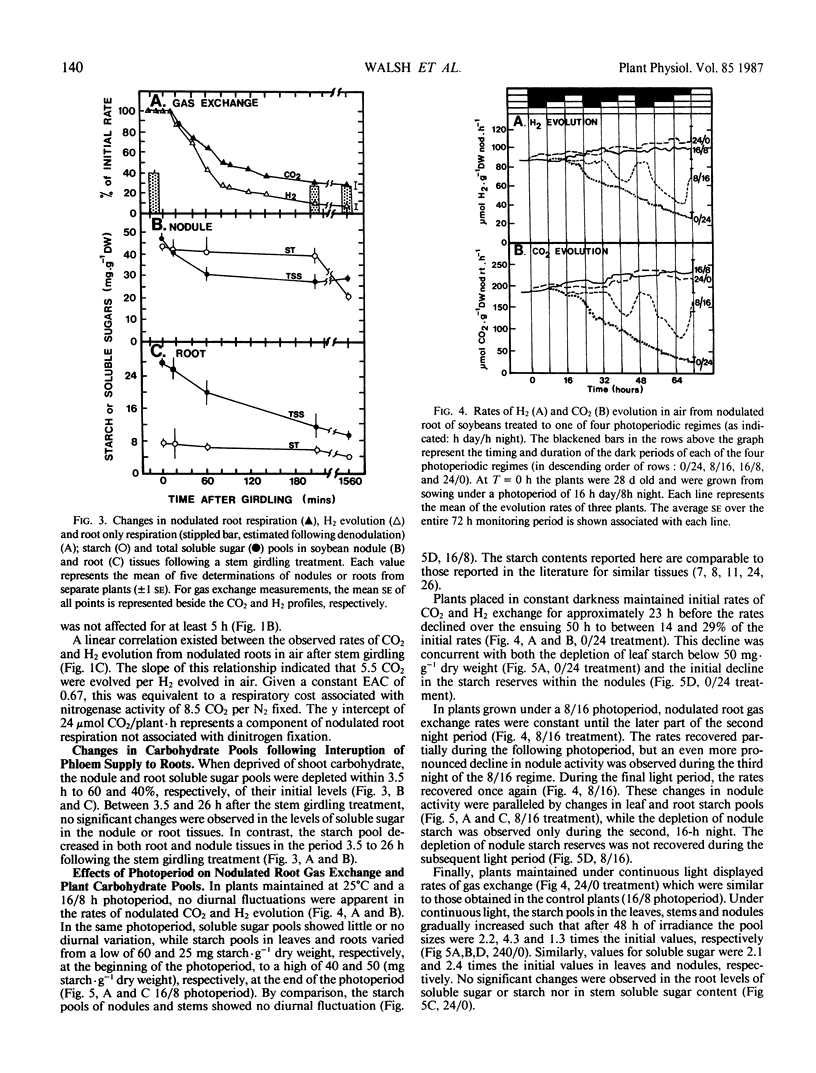
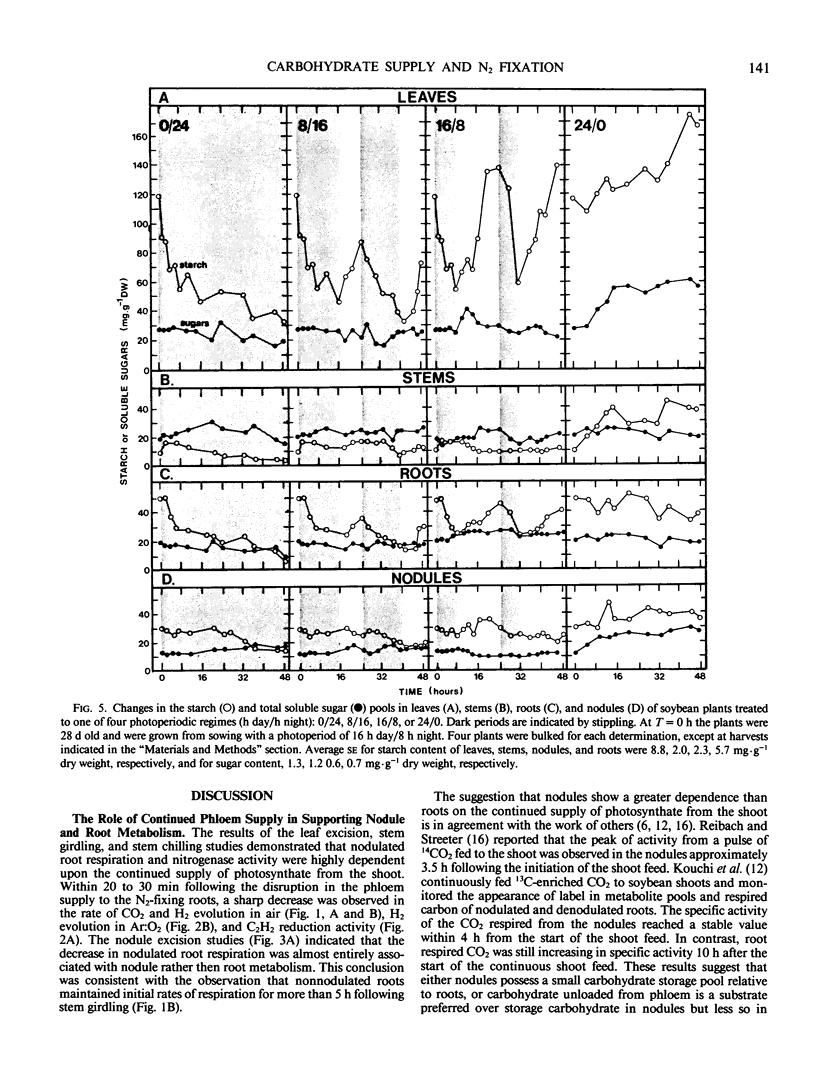
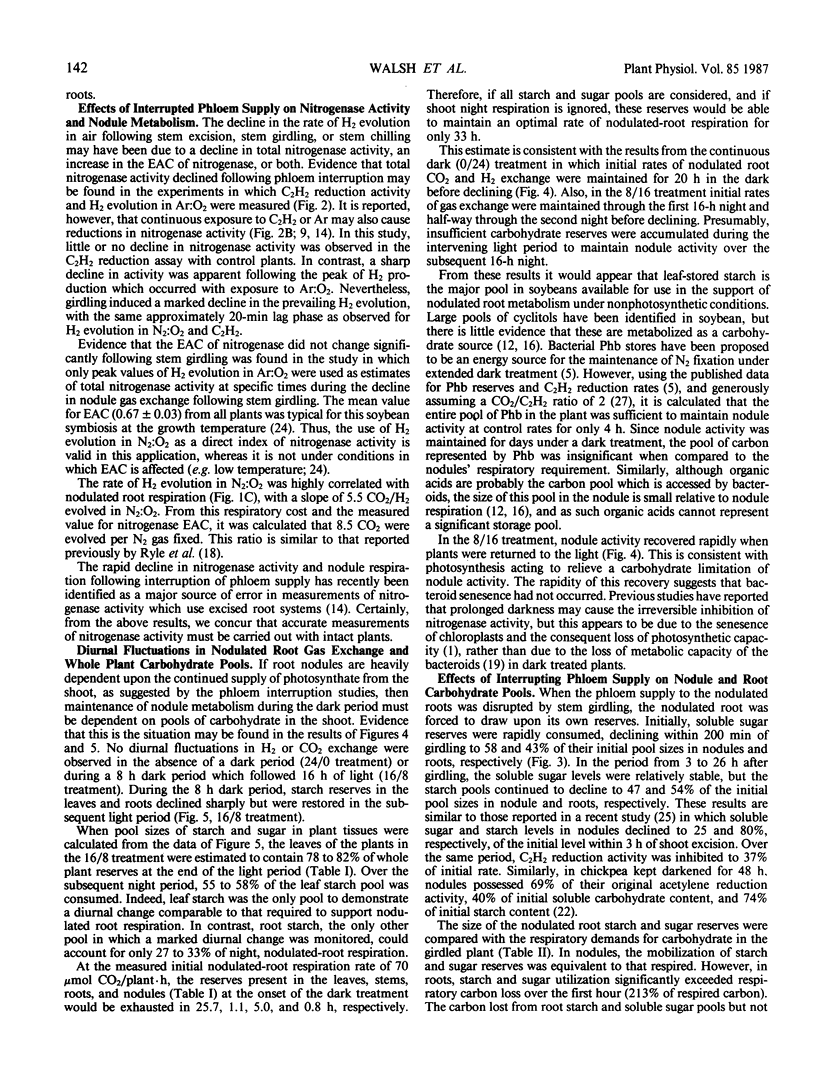
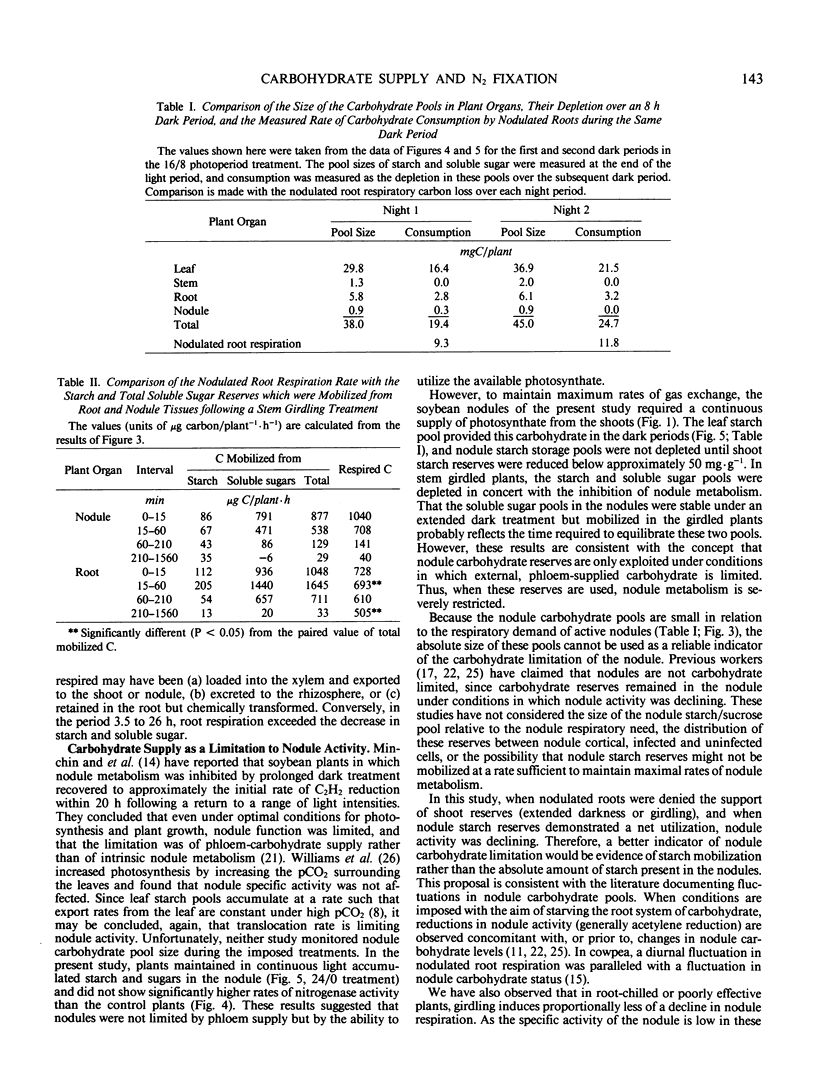
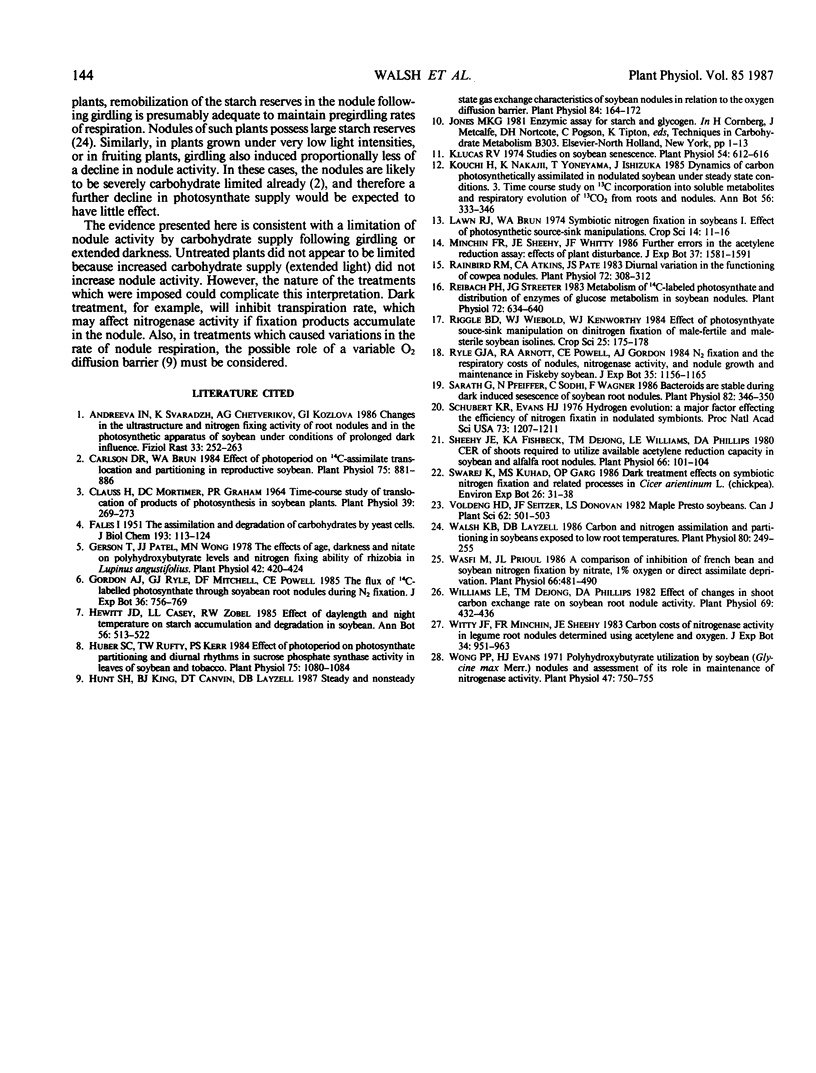
Images in this article
Selected References
These references are in PubMed. This may not be the complete list of references from this article.
- Carlson D. R., Brun W. A. Effect of shortened photosynthetic period on C-assimilate translocation and partitioning in reproductive soyeans. Plant Physiol. 1984 Aug;75(4):881–886. doi: 10.1104/pp.75.4.881. [DOI] [PMC free article] [PubMed] [Google Scholar]
- Clauss H., Mortimer D. C., Gorham P. R. Time-course Study of Translocation of Products of Photosynthesis in Soybean Plants. Plant Physiol. 1964 Mar;39(2):269–273. doi: 10.1104/pp.39.2.269. [DOI] [PMC free article] [PubMed] [Google Scholar]
- Huber S. C., Rufty T. W., Kerr P. S. Effect of Photoperiod on Photosynthate Partitioning and Diurnal Rhythms in Sucrose Phosphate Synthase Activity in Leaves of Soybean (Glycine max L. [Merr.]) and Tobacco (Nicotiana tabacum L.). Plant Physiol. 1984 Aug;75(4):1080–1084. doi: 10.1104/pp.75.4.1080. [DOI] [PMC free article] [PubMed] [Google Scholar]
- Hunt S., King B. J., Canvin D. T., Layzell D. B. Steady and nonsteady state gas exchange characteristics of soybean nodules in relation to the oxygen diffusion barrier. Plant Physiol. 1987 May;84(1):164–172. doi: 10.1104/pp.84.1.164. [DOI] [PMC free article] [PubMed] [Google Scholar]
- Klucas R. V. Studies on soybean nodule senescence. Plant Physiol. 1974 Oct;54(4):612–616. doi: 10.1104/pp.54.4.612. [DOI] [PMC free article] [PubMed] [Google Scholar]
- Rainbird R. M., Atkins C. A., Pate J. S. Diurnal variation in the functioning of cowpea nodules. Plant Physiol. 1983 Jun;72(2):308–312. doi: 10.1104/pp.72.2.308. [DOI] [PMC free article] [PubMed] [Google Scholar]
- Reibach P. H., Streeter J. G. Metabolism of C-labeled photosynthate and distribution of enzymes of glucose metabolism in soybean nodules. Plant Physiol. 1983 Jul;72(3):634–640. doi: 10.1104/pp.72.3.634. [DOI] [PMC free article] [PubMed] [Google Scholar]
- Sarath G., Pfeiffer N. E., Sodhi C. S., Wagner F. W. Bacteroids Are Stable during Dark-Induced Senescence of Soybean Root Nodules. Plant Physiol. 1986 Oct;82(2):346–350. doi: 10.1104/pp.82.2.346. [DOI] [PMC free article] [PubMed] [Google Scholar]
- Schubert K. R., Evans H. J. Hydrogen evolution: A major factor affecting the efficiency of nitrogen fixation in nodulated symbionts. Proc Natl Acad Sci U S A. 1976 Apr;73(4):1207–1211. doi: 10.1073/pnas.73.4.1207. [DOI] [PMC free article] [PubMed] [Google Scholar]
- Sheehy J. E., Fishbeck K. A., Dejong T. M., Williams L. E., Phillips D. A. Carbon exchange rates of shoots required to utilize available acetylene reduction capacity in soybean and alfalfa root nodules. Plant Physiol. 1980 Jul;66(1):101–104. doi: 10.1104/pp.66.1.101. [DOI] [PMC free article] [PubMed] [Google Scholar]
- Walsh K. B., Layzell D. B. Carbon and nitrogen assimilation and partitioning in soybeans exposed to low root temperatures. Plant Physiol. 1986 Jan;80(1):249–255. doi: 10.1104/pp.80.1.249. [DOI] [PMC free article] [PubMed] [Google Scholar]
- Williams L. E., Dejong T. M., Phillips D. A. Effect of changes in shoot carbon-exchange rate on soybean root nodule activity. Plant Physiol. 1982 Feb;69(2):432–436. doi: 10.1104/pp.69.2.432. [DOI] [PMC free article] [PubMed] [Google Scholar]
- Wong P. P., Evans H. J. Poly-beta-hydroxybutyrate Utilization by Soybean (Glycine max Merr.) Nodules and Assessment of Its Role in Maintenance of Nitrogenase Activity. Plant Physiol. 1971 Jun;47(6):750–755. doi: 10.1104/pp.47.6.750. [DOI] [PMC free article] [PubMed] [Google Scholar]



